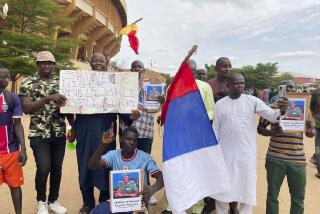Zaire Leader Ends Seclusion, Hints at Solution to Crisis
- Share via
KINSHASA, Zaire — Mobutu Sese Seko, Africa’s longest-ruling dictator, solved one mystery here Sunday but immediately sparked another.
The first was simple. The cancer-stricken president briefly met reporters, looking tired and frail. But he smiled and walked unaided, ending widespread speculation that he was dead or nearly so.
“I am named Mobutu,” he said softly, wearing his trademark leopard-skin cap and waving his silver-topped ebony cane at the crush of cameras and microphones.
“I have come here not to pursue the fortunes of Mobutu and the interests of Mobutu, as you sometimes write,” he said, two days after his return from France. “I have come in the higher interests of Zaire. That is, for the unity and integrity of our territory.”
Asked about his health, he replied, “I am as you see me.” Western diplomats expect the 66-year-old leader to return to his opulent villa on the French Riviera in a week or so to resume treatment for prostate cancer.
Mobutu’s theatrical appearance on the sunny back portico of his palace, where peacocks and armed commandos strut in lush gardens overlooking the broad Zaire River, was the first time any outsider had seen him since his bizarre return.
Government ministers and other senior officials who had gathered to greet him at the airport Friday were shooed away before Mobutu would come off the jet. That sent shock waves through this nervous capital and prompted headlines questioning whether Mobutu was comatose or worse.
But Mobutu posed another riddle Sunday by saying he will announce plans in 48 hours to help resolve the worst crisis his ruthless regime has faced since he seized power in a coup 32 years ago.
Armed guerrillas led by bush fighter Laurent Kabila have captured nearly a quarter of this vast, mineral-rich nation since October. The rebels have routed Mobutu’s army and have been welcomed as heroes by festive crowds. Kabila said he intends to take Kinshasa, the capital, by June.
It’s unclear what, if anything, Mobutu can do to salvage what remains of his once-invincible power and charismatic aura.
Few here expect Mobutu--who once said he would never be an ex-president, just a dead one--to accede to Kabila’s primary demand: that he resign.
Mobutu’s other options are limited. Before leaving France last week, he proposed forming a “national unity council” of major political players. But he has created similar conclaves of contentious rivals to forestall change before, and Kabila has indicated he has no interest in joining such a group.
A more likely scenario is that Mobutu will reshuffle his government and fire his prime minister, Leon Kengo wa Dondo. But Kengo’s status and authority are disputed anyway, since he lost an overwhelming vote of no confidence in Parliament last week. He insists that the vote was illegal and has refused to step down.
Diplomats say Kengo’s most likely replacement is Etienne Tshisekedi, a former prime minister and opposition leader. But Tshisekedi’s appointment, or anyone else’s, would be significant only if he is authorized to sue for peace with Kabila on Mobutu’s behalf.
“I think from our side, if there is any serious effort for negotiations, we in the international community would say, ‘OK, Kabila, he’s done something, now it’s your turn,’ ” a Western diplomat said.
The broader question is whether Kabila needs to negotiate. Mobutu’s army has collapsed, and a rebel victory looks increasingly likely. But diplomats here say Kabila is facing mounting difficulties administering the newly conquered areas and that his multi-party, multiethnic alliance is showing fissures.
In his Sunday news conference, Mobutu appeared with South African Deputy President Thabo Mbeki, who flew in for the day in the latest effort to broker talks leading to a cease-fire in Zaire. Mbeki delivered a letter from President Nelson Mandela and said he was confident that the peace process would move “forward to a resolution.”
Meanwhile, the first wave of U.S. soldiers arrived in Brazzaville, Congo, on Sunday to prepare for the possible evacuation of Americans from Zaire. About 500 American civilians live in Zaire, about 320 of them in Kinshasa, across the Zaire River from Brazzaville.
The commander of the task force, Maj. Gen. Edwin P. Smith, said he expects to have about 200 U.S. soldiers in Brazzaville within the next few days and 100 or so more in Libreville, the capital of neighboring Gabon.
More to Read
Sign up for Essential California
The most important California stories and recommendations in your inbox every morning.
You may occasionally receive promotional content from the Los Angeles Times.














